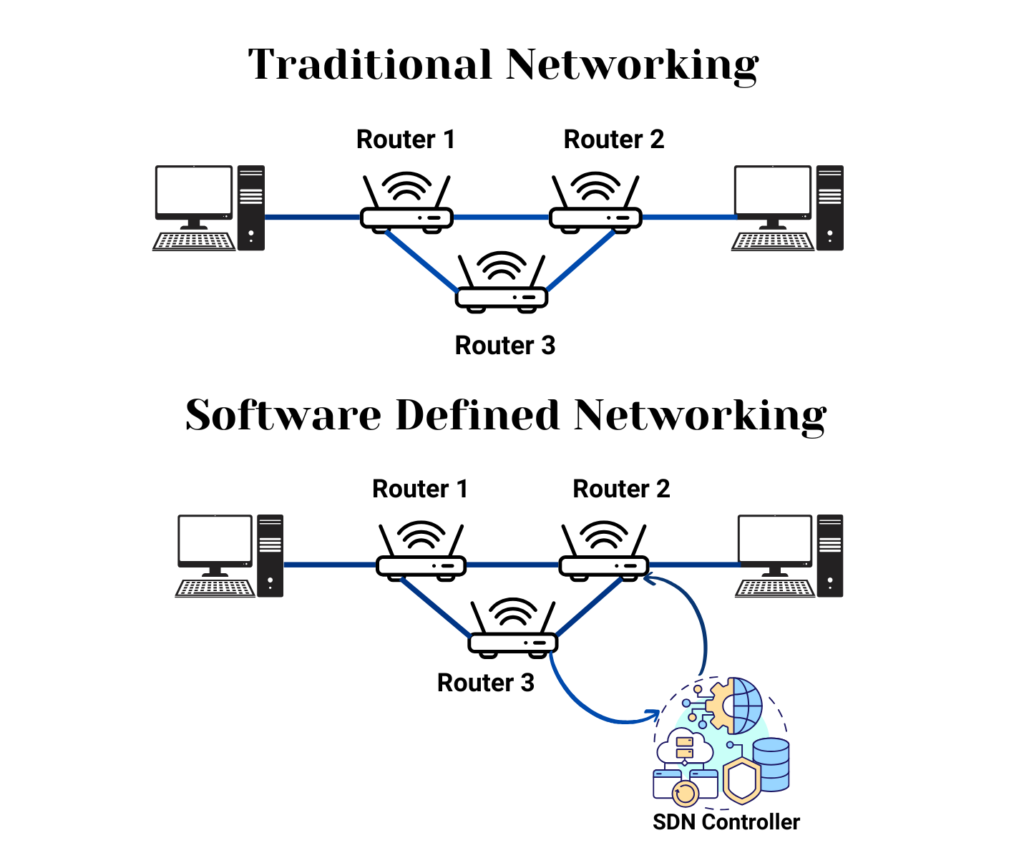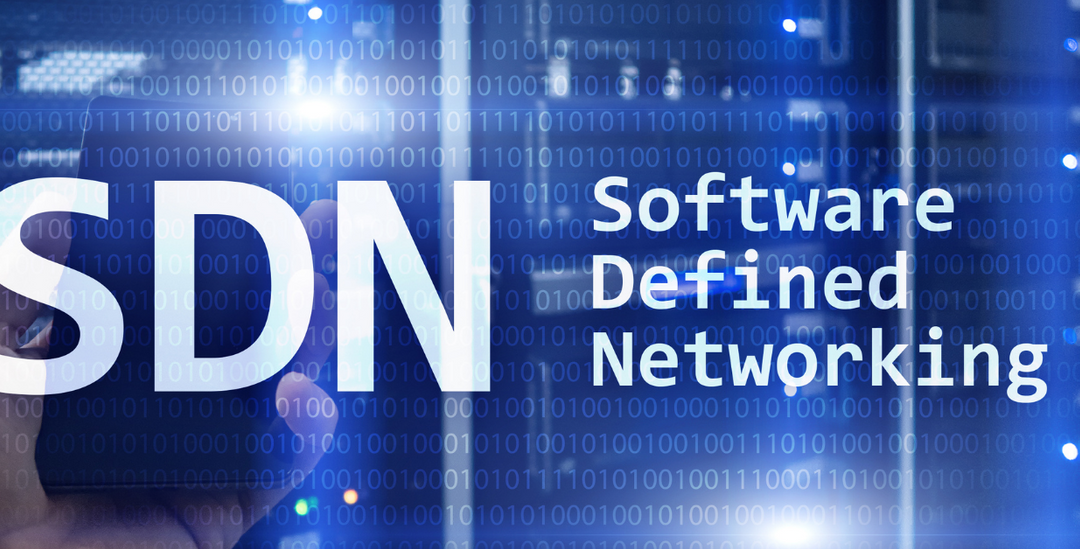What is Software-Defined Networking (SDN)?
Software Defined Network decouples the control plane from the data plane in network architecture, allowing centralized management and greater flexibility. In healthcare, SDN enables real-time monitoring and response to network anomalies, enhancing security and reliability.
Traditional Networking vs Software Defined Networking:

Software-Defined Networking Using OpenFlow
Software-defined networking using OpenFlow provides a programmable interface that enables dynamic control over network traffic. OpenFlow separates the control plane from the data plane, allowing for more efficient routing and automation. By leveraging OpenFlow, organizations can optimize traffic flows, reduce congestion, and enhance security through granular policy enforcement. The ability to dynamically reconfigure network paths ensures resilience and improved performance, making OpenFlow a crucial component of SDN architecture.
Software Defined Network in Different Industries
Industries such as healthcare, finance, and manufacturing benefit from software-defined networks by enhancing security, reducing latency, and enabling automation. In the healthcare industry, SDN ensures secure patient data transmission and supports telemedicine applications. In finance, it improves transaction speeds, risk management, and fraud detection by dynamically adjusting network policies. Manufacturing sectors utilize SDN to automate industrial processes, optimize supply chain management, and improve IoT device communication, leading to higher efficiency and cost savings.
Software Defined Networking App
SDN applications optimize network management by providing centralized control, real-time analytics, and automated responses to network changes. These apps ensure seamless connectivity and security across enterprise environments. From cloud-based SDN controllers to AI-driven traffic management applications, SDN apps help organizations achieve greater agility, reduce downtime, and improve overall network resilience. Businesses rely on SDN apps for monitoring performance, identifying security threats, and dynamically adjusting resource allocation to maintain seamless operations.
Software Defined Networking Layers
Software-defined networking consists of three primary layers: the application layer, control layer, and infrastructure layer. The application layer enables business and network applications to communicate network requirements to the control layer. The control layer acts as the central intelligence, managing policies and directing data flow. The infrastructure layer comprises the physical and virtual network devices that execute the instructions from the control layer. These layers work together to enhance network flexibility, improve automation, and reduce operational complexities.
Software Defined Network Controller
The SDN controller acts as the brain of the network, managing data flow between devices. It enables centralized control, improves security, and enhances network efficiency. By abstracting network intelligence from hardware, the SDN controller allows network administrators to configure and manage network policies through a single, unified platform. Open-source controllers like OpenDaylight and proprietary solutions like Cisco’s APIC simplify the deployment of dynamic and scalable network environments.
SDN Security
Security in software-defined networking is enhanced through micro-segmentation, encryption, and real-time monitoring. SDN security solutions help prevent cyber threats and ensure data integrity. By dynamically segmenting network traffic, SDN prevents lateral movement of threats, reducing the risk of breaches. Additionally, SDN integrates with advanced threat intelligence systems to detect and mitigate security incidents in real time. With SDN’s centralized policy management, organizations can enforce consistent security protocols across the entire network infrastructure.
Software Defined Networking and Cloud Computing
SDN and cloud computing work together to create scalable and dynamic network architectures. By integrating SDN, cloud networks become more efficient, secure, and manageable. SDN facilitates multi-cloud connectivity, enabling businesses to extend workloads across public and private cloud environments. By decoupling network control from hardware, SDN ensures seamless traffic routing, enhanced security compliance, and cost-effective cloud resource utilization.
SDN Solutions
SDN solutions include virtualized networking, automated traffic management, and AI-driven analytics to improve network performance and security. Organizations can choose from open-source SDN frameworks like ONOS and proprietary platforms like VMware NSX to implement network virtualization, optimize bandwidth allocation, and integrate with existing IT ecosystems.
Software Defined Networking Cyber Security
SDN enhances cybersecurity through network segmentation, intrusion detection, and AI-driven threat analysis. SDN-powered security frameworks continuously monitor network traffic for anomalies, enabling faster threat response. By leveraging machine learning algorithms, SDN security solutions identify potential vulnerabilities and automate mitigation strategies, reducing human intervention and improving incident resolution time.
Case Study: AI and SDN in a Healthcare Organization
A leading healthcare provider implemented an SDN solution integrated with AI analytics to secure its network. The system monitored real-time traffic, identified vulnerabilities, and provided actionable insights. This reduced the risk of data breaches while ensuring uninterrupted patient care.
FAQs
Q1. How does Devomech provide secure software-defined networking solutions?
A: Devomech offers AI-driven security features, real-time threat detection, and encryption to ensure secure SDN environments.
Q2. What are the benefits of using Devomech’s SDN solutions?
A: Devomech’s SDN solutions provide enhanced scalability, automation, and robust security features tailored for modern enterprises.
Q3. How does Devomech integrate SDN with cloud computing?
A: Devomech leverages SDN to optimize cloud network performance, improve resource allocation, and ensure secure data transmission.
Q4. Does Devomech offer SDN solutions for different industries?
A: Yes, Devomech provides industry-specific SDN solutions for healthcare, finance, manufacturing, and more, ensuring optimal network performance.

